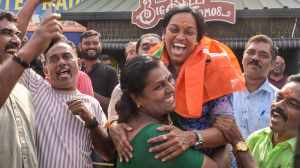Maharashtra Deputy Chief Minister Devendra Fadnavis’ admission that he had taken “revenge” by engineering the split in the Shiv Sena in June has received massive pushback from political rivals who have claimed that such “politics of badla (revenge)” is a “blot” on the land of sants and Chhatrapati Shivaji. This is not the first time that Fadnavis has owned up to his role as the architect of the fall of the Uddhav Thackeray-led Maha Vikas Aghadi (MVA) alliance government.
In an interview to Marathi news channel SAAM TV, Fadnavis said, “If anyone betrays me, I will take revenge. Yes, I have taken revenge.” Explaining his “philosophy of badla”, the BJP leader said, “If those who enjoyed power with you, those who were with you round the clock, and those who were elected along with you, directly stab you in back, then to stay alive in politics, you need to give it back to him. Otherwise, you cannot survive in politics. In politics, you should remain good. But if someone is taking advantage of you for being good to them and betraying you, then such people should be shown their place. I have shown him his place. And I am proud of myself. If you betray me, I will take revenge.”

The “betrayal” Fadnavis refers to is the Thackeray-led Shiv Sena’s decision to break its alliance with the BJP and join hands with the Nationalist Congress Party (NCP) and the Congress to form the government after the 2019 Assembly elections. Uddhav has alleged that the decision was taken because the BJP reneged on its promise to share the chief minister’s post with his party.
After a press conference in Pune in 2019, Fadnavis told The Indian Express, “I wanted to go to Uddhav’s residence and personally sort out the matter. He refused to even meet me over a cup of tea.”
As the decades-old alliance fell apart, the BJP central leadership in Delhi was reportedly upset with Fadnavis. “There was a feeling in the party that instead of Fadnavis, Nitin Gadkari should have been asked to handle the situation. This came as a double blow to Fadnavis. And since then Fadnavis was looking for an opportunity to strike back and prove his political mettle,” said a BJP leader.
According to the party insider, splitting the Shiv Sena was Fadnavis’ chance to prove a point to his detractors both within and outside the party. At the India Today Conclave earlier this month, the Deputy CM spoke about what drove him and his party to engineer the split in the Sena. “While in the Opposition, we were looking for an opportunity to take revenge for the way Uddhav Thackeray backstabbed us and for the way the Shiv Sena treated us. We wanted revenge and therefore backed Shinde ji,” he said.
BJP and Shinde factions exposed: Opposition
The Shiv Sena’s chief spokesperson Sanjay Raut, who praised Fadnavis a few days earlier, said that the politics of revenge had never been a part of “Maharashtra’s culture. ”
Story continues below this ad
He went on to say, “In Maharashtra, politics is not played on the sentiment of revenge. If new precedents and traditions are being set up, then this is against the culture of Maharashtra. In politics, a difference of opinion is common but to date, no one has used the word badla (revenge) in Maharashtra politics. By resorting to such politics, Fadnavis has lowered his stature which is unfortunate.”
NCP chief spokesperson Mahesh Tapase also accused Fadnavis of taking “Maharashtra politics to a new low”. Maharashtra was known as the “land of change” and not the “land of revenge”, he said, adding, “Our party has never indulged in this kind of tactics. We have never tried to finish ofd any party politically. We have always spoken about taking Maharashtra forward and not down. By resorting to ungainly tactics, the BJP and Fadnavis have only exposed themselves.”
Tapase said, “We have always spoken about bringing about positive change and never resorted to politics of vindictiveness. The BJP should have adopted democratic ways like defeating the Shiv Sena in the electoral ring but, instead, it chose to bring down the Sena. Politics should be an instrument to bring change for good in the larger interest of the common man. Maharashtra has never seen such a culture as our party chief Sharad Pawar has always attacked the policies of the ruling party and never targeted them personally.”
Senior Congress leader Satej Patil, who was a minister in the MVA government said, “In more than 30 years of his political career, he has never seen such a politics being practised in Maharashtra. The Congress has never resorted to lowering itself so low for proving its political prowess. We always defeated our opponents in the electoral ring and never went after them at a personal level.”
Story continues below this ad
Patil said Fadnavis’ statement had exposed both the BJP and the Shinde camp. “The Shinde camp had been repeatedly saying that they dumped Shiv Sena because it joined hands with ideologically different parties like the Congress and the NCP. They alleged that Shiv Sena abandoned its policy of Hindutva and that forced them to quit the party. On the other hand, the BJP kept repeatedly saying that it had no role to play in Shiv Sena’s split. But now with Fadnavis confessing that he was looking for an opportunity to take revenge, their lies have been exposed. It is an embarrassment for both the BJP and the Shinde camp who now come across as untrustworthy.”
NCP leader Ankush Kakade, a close associate of Sharad Pawar for over four decades, said, “From the days of Yeshwantrao Chavan to the days of Fadnavis, Maharashtra’s political culture has sunk to a new low. In the land of sants and Chhatrapati Shivaji Maharaj where we talk of backing and uplifting each other, the BJP is talking of bringing down its own brethren. Fadnavis’ confession is indeed very unfortunate and shows BJP in a very poor light. It means the BJP as a party will sink to any low to get even with its political opponents. Political opponents should be defeated through democratic means and not by dirty politics. Uddhav Thackeray did not backstab the BJP, he openly joined hands with the Congress and the NCP. He gave enough opportunity to the BJP to decide whether it was in favour of giving the chief ministership to the Shiv Sena. The BJP remained adamant. That forced the Sena to veer towards the Congress and the NCP. Fadnavis claims is entirely wrong and is attempting to lower the image of Uddhav Thackeray.”

































